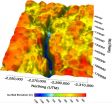(Press-News.org) Screening families of patients with bowel cancer for a genetic condition would cut their risk of developing bowel, womb, and ovarian cancers, new research has found.
In a major study, Dr Ian Frayling from Cardiff University's School of Medicine and researchers from the University of Exeter's Medical School assessed the effectiveness of introducing a UK-wide screening programme for a genetic condition known as Lynch Syndrome.
Lynch syndrome is a caused by changes in genes which check the spelling in DNA. The condition increases the risk of people developing cancer, particularly bowel cancer and cancers of the womb and ovaries later in life. Without testing cancers, it is not obvious that they are caused by Lynch syndrome, and so it is often not diagnosed.
It is responsible for around one in 12 cases of people aged under 50 and around a third of people with the disease develop bowel cancer by the time they are 70, if no action is taken.
"If Lynch Syndrome is identified as the cause of bowel cancer, patients can be offered risk-reducing measures such as more intensive post-operative colonoscopy surveillance to spot recurrences and new cancers early," according to Cardiff University's Dr Ian Frayling, the clinical adviser to the study.
"As close relatives have a 50 per cent chance of sharing the gene, screening would provide a valuable opportunity to detect the condition in children, siblings, parents and more distant relatives.
"It would mean measures could be taken to reduce the risk of cancers developing," he added.
The findings, published in Health Technology Assessment, indicate that screening the 1,700 people under the age of 50 who are newly diagnosed with bowel cancer (in England) each year would identify two thirds of these whose cancer was caused by Lynch Syndrome.
From this group, the findings suggest that 40 further cases of cancer could be avoided in them and their relatives.
Dr Frayling adds: "This is a very significant piece of work which is much to be welcomed.
"It justifies the National Health Services in the UK in implementing such testing, which is already carried out in other European countries.
"Those with Lynch Syndrome will now be found and given the care that they warrant, saving time, lives, money and resources. Colleagues around the world are eager to use the model developed by the University of Exeter's Medical School, so the benefits extend far beyond the UK."
The team systematically reviewed all the evidence surrounding Lynch Syndrome and bowel cancer, identifying and assessing 42 studies in total, before constructing a computer model of screening strategies for Lynch Syndrome.
It found that all screening strategies helped improve health outcomes at a cost generally acceptable to the NHS. The most cost-effective method of identifying Lynch Syndrome involved running tests on the tumour before offering counselling and genetic testing.
In a separate analysis, which has not yet been published or peer-reviewed, the team used the same model to estimate that 28 cancer related deaths (24 from bowel cancer and four from womb cancer) could be prevented each year if Lynch Syndrome screening for people with bowel cancer was introduced.
Dr Tristan Snowsill, of the University of Exeter's Medical School, said: "This is the first evidence that systematic testing for Lynch syndrome could be cost-effective in the NHS.
"There are health professionals in the NHS who think cost-effectiveness is the hurdle that needs to be cleared before systematic testing can be implemented; policymakers now have that evidence before them to decide if this is right for the NHS, a decision which will not be solely based on cost-effectiveness."
Deborah Alsina, Chief Executive of Bowel Cancer UK, commented: "We welcome these research findings which demonstrate that lives can be saved through earlier identification of those who are at higher risk of bowel cancer because of genetic conditions like Lynch syndrome.
"It's critical that more lives are saved by ensuring people gain access to the screening surveillance they need, so that bowel cancer can be ruled out first, not last, in younger patients.
"While bowel cancer is thankfully relatively rare in people under 50, there are still 550 people in this age group who lose their lives to bowel cancer each year and that must change."
INFORMATION:
The research was funded by the National Institute for Health Research (NIHR), with support to Dr Frayling from the National Institute for Social Care and Health Research (NISCHR) via Cardiff and Vale University Health Board.
Genetic test would help 'cut bowel cancer spread'
2014-09-30
ELSE PRESS RELEASES FROM THIS DATE:
Bacteria may have ability to reduce impact of diazepam on UK river environments
2014-09-30
The natural photo degradation of diazepam (valium) and similar medicines – followed by bacterial breakdown – may reduce their potentially harmful impact on the UK's freshwater environment, a team of researchers has said.
Diazepam – used to treat anxiety and other similar conditions – has been detected in rivers across the UK and Europe, having been released from waste water treatment plants. At the levels recorded, it has the potential to produce harmful ecological effects in surface waters, including changing the behaviour of fish shoals and their ability to sense danger ...
Entanglement made tangible
2014-09-30
Quantum entanglement refers to the "pairing" of two subatomic particles in such a way that they form a whole quantum system. Interest in entanglement is increasing today, as it challenges the foundations of quantum mechanics itself, and is also key for achieving quantum information processing and communication. Entanglement is thought to exist up to the everyday, or "macroscopic" realm – according to the predictions of quantum physics – but experimental proposals to show this often involve conditions that are difficult to achieve in today's labs. Publishing in Physical ...
Shape up quickly -- applies to fish, too!
2014-09-30
Fish can live in almost any aquatic environment on Earth, but when the climate changes and temperatures go up many species are pushed to the limit. The amount of time needed to adjust to new conditions could prove critical for how different species cope in the future, reveals a new study from researchers at the University of Gothenburg, published in the scientific journal Proceedings of the Royal Society B.
Climate change continues apace thanks to increasing levels of greenhouse gases in the atmosphere. The greenhouse effect has led not only to an increase in average ...
Dietary polyunsaturated fatty acids linked to smaller risk of coronary heart disease
2014-09-30
A recent study completed at the University of Eastern Finland shows that dietary polyunsaturated fatty acids may reduce the risk of coronary heart disease. The sources of polyunsaturated fatty acids include fish, vegetable oils, and nuts. The findings were published in Arteriosclerosis, Thrombosis & Vascular Biology, an esteemed journal of the American Heart Association.
Recent studies have not found an association between the consumption of saturated fats and the risk of cardiovascular diseases. It seems that the mere reduction of saturated fats from the diet does not ...
On the trail of the truffle flavor
2014-09-30
This news release is available in German. FRANKFURT. Truffles, along with caviar, are among the most expensive foods in the world. Because they grow underground, people use trained dogs or pigs to find them. But the distinctive smell of truffles is not only of interest to gourmets. A group of German and French scientists under the direction of the Goethe University Frankfurt have discovered that the smell of white truffles is largely produced by soil bacteria which are trapped inside truffle fruiting bodies.
White truffles from the Piedmont region in Italy can reach ...
NASA ocean data shows 'climate dance' of plankton
2014-09-30
The greens and blues of the ocean color from NASA satellite data have provided new insights into how climate and ecosystem processes affect the growth cycles of phytoplankton—microscopic aquatic plants important for fish populations and Earth's carbon cycle.
At the bottom of the ocean's food chain, phytoplankton account for roughly half of the net photosynthesis on Earth. Their photosynthesis consumes carbon dioxide and plays a key role in transferring carbon from the atmosphere to the ocean. Unlike the plant ecosystems on land, the amount of phytoplankton in the ocean ...
NASA support key to glacier mapping efforts
2014-09-30
Thanks in part to support from NASA and the National Science Foundation, scientists have produced the first-ever detailed maps of bedrock beneath glaciers in Greenland and Antarctica. This new data will help researchers better project future changes to glaciers and ice sheets, and ultimately, sea level.
Researchers at the Center for Remote Sensing of Ice Sheets, or CReSIS, at the University of Kansas in Lawrence, Kansas, recently built detailed maps of the terrain beneath Greenland's Jakobshavn Glacier and Byrd Glacier in Antarctica. The results of this study were published ...
NASA-funded rocket has 6 minutes to study solar heating
2014-09-30
On Sept. 30, 2014, a sounding rocket will fly up into the sky – past Earth's atmosphere that obscures certain wavelengths of light from the sun -- for a 15-minute journey to study what heats up the sun's atmosphere. This is the fourth flight for the Very high Angular Resolution Ultraviolet Telescope, or VAULT, will launch from the White Sands Missile Range near Las Cruces, New Mexico.
The instrument, now called VAULT2.0, has been refurbished with new electronics and an imaging detector to capture images more frequently than before. While in space, VAULT2.0 will observe ...
Deceptive-looking vortex line in superfluid led to twice-mistaken identity
2014-09-30
So long, solitons: University of Chicago physicists have shown that a group of scientists were incorrect when they concluded that a mysterious effect found in superfluids indicated the presence of solitons—exotic, solitary waves. Instead, they explain, the result was due to more pedestrian, whirlpool-like structures in the fluid. They published their explanation in the Sept. 19 issue of Physical Review Letters.
The debate began in July 2013, when a group of scientists from the Massachusetts Institute of Technology published results in Nature showing a long-lived structure ...
New discovery approach accelerates identification of potential cancer treatments
2014-09-30
ANN ARBOR—Researchers at the University of Michigan have described a new approach to discovering potential cancer treatments that requires a fraction of the time needed for more traditional methods.
They used the platform to identify a novel antibody that is undergoing further investigation as a potential treatment for breast, ovarian and other cancers.
In research published online in the Proceedings of the National Academy of Sciences, researchers in the lab of Stephen Weiss at the U-M Life Sciences Institute detail an approach that replicates the native environment ...





